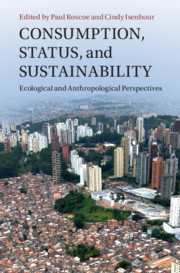Book contents
- Consumption, Status, and Sustainability
- New Directions In Sustainability And Society
- Consumption, Status, and Sustainability
- Copyright page
- Contents
- Figures
- Tables
- Contributors
- Preface
- 1 Standing Out, Fitting In, and the Consumption of the World
- Part I Status Competition and Hierarchy in Human Societies
- Part II Variability in Status Consumption
- Part III Continuity and Discontinuity
- Part IV Bending the Curve
- Index
- References
Part I - Status Competition and Hierarchy in Human Societies
Published online by Cambridge University Press: 30 July 2021
- Consumption, Status, and Sustainability
- New Directions In Sustainability And Society
- Consumption, Status, and Sustainability
- Copyright page
- Contents
- Figures
- Tables
- Contributors
- Preface
- 1 Standing Out, Fitting In, and the Consumption of the World
- Part I Status Competition and Hierarchy in Human Societies
- Part II Variability in Status Consumption
- Part III Continuity and Discontinuity
- Part IV Bending the Curve
- Index
- References
Summary

- Type
- Chapter
- Information
- Consumption, Status, and SustainabilityEcological and Anthropological Perspectives, pp. 31 - 84Publisher: Cambridge University PressPrint publication year: 2021



